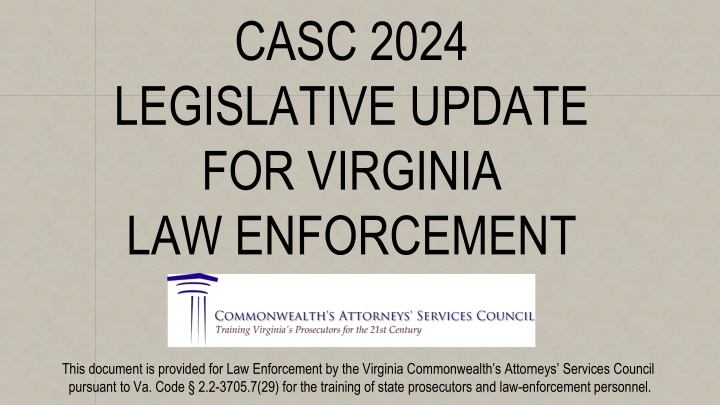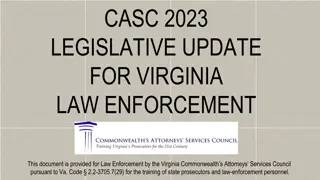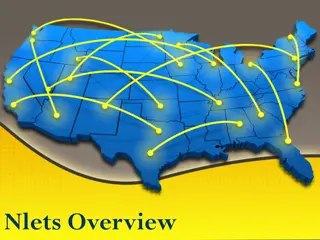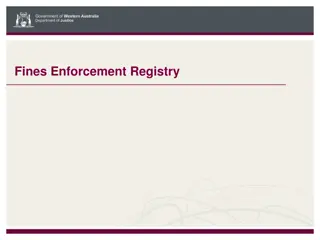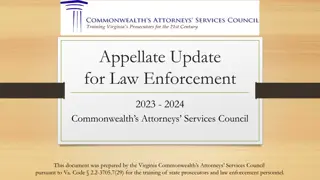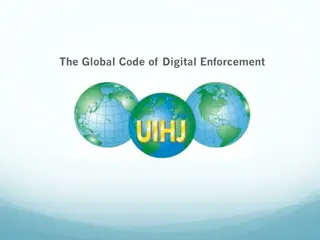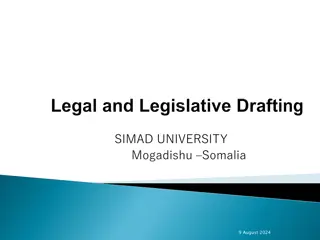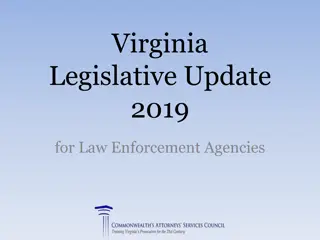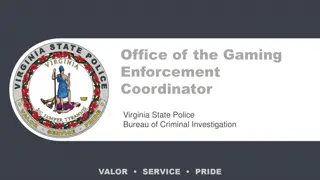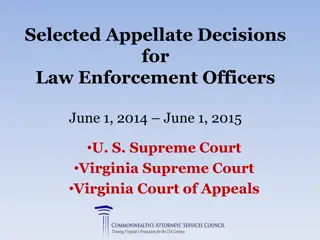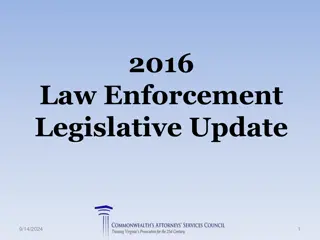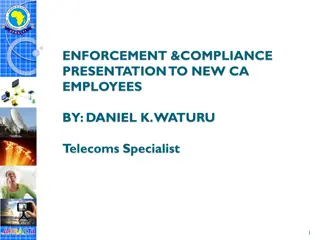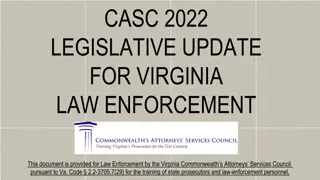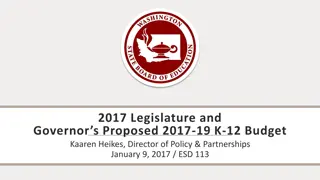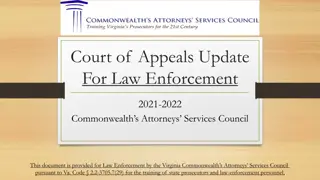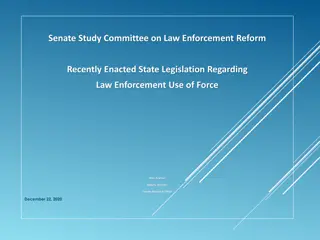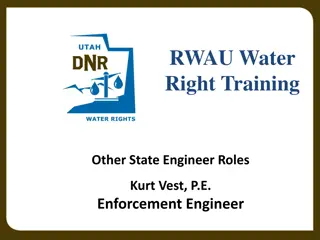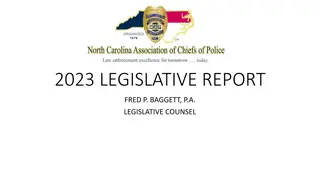2024 Virginia Legislative Update for Law Enforcement: Impactful Changes & Updates
This document provides a comprehensive overview of the legislative updates from the 2024 General Assembly Regular Session with a focus on their impact on law enforcement and public safety in Virginia. It covers a range of topics including criminal investigations, procedures, new offenses, regulatory requirements, and more. The updates address key aspects such as drug court protocols, nicotine regulations, traffic offenses, and procedural guarantees for law enforcement personnel. Readers are encouraged to refer to the actual laws on the LIS website for detailed information.
Download Presentation

Please find below an Image/Link to download the presentation.
The content on the website is provided AS IS for your information and personal use only. It may not be sold, licensed, or shared on other websites without obtaining consent from the author.If you encounter any issues during the download, it is possible that the publisher has removed the file from their server.
You are allowed to download the files provided on this website for personal or commercial use, subject to the condition that they are used lawfully. All files are the property of their respective owners.
The content on the website is provided AS IS for your information and personal use only. It may not be sold, licensed, or shared on other websites without obtaining consent from the author.
E N D
Presentation Transcript
CASC 2024 LEGISLATIVE UPDATE FOR VIRGINIA LAW ENFORCEMENT This document is provided for Law Enforcement by the Virginia Commonwealth s Attorneys Services Council pursuant to Va. Code 2.2-3705.7(29) for the training of state prosecutors and law-enforcement personnel.
Materials This PowerPoint attempts to identify the legislation from the 2024 General Assembly Regular Session that has the greatest impact on law enforcement and public safety. Consult the 2024 Legislative Update Master List outline for full listing of bills of interest. This presentation will NOT cover every bill.
Materials You must rely only upon the final language of the bill after passage. Slides summarize each bill, but you should read the actual law before acting. You can find the bill on the LIS website at: http://lis.virginia.gov/lis.htm.
Topics for this Presentation Criminal Investigations Criminal Procedure New and Amended Crimes and Offenses Liquid Nicotine Traffic Offenses FOIA ECO and TDO Procedure Law Enforcement Regulatory & Reporting Requirements Law Enforcement Procedural Guarantees and Requirements
Ch. 33: Drug Court release for PMP Amends 54.1-2523 to require the Director of the Department of Health Professions to release otherwise confidential information from the Prescription Monitoring Program when such information is relevant to a specific investigation, supervision, or monitoring of a specific recipient for purposes of the administration of criminal justice to drug court administrators and behavioral health docket administrators who have completed the Virginia State Police Drug Diversion School designated by the Director of the Department of Corrections or his designee. Bill requires release of the information upon receiving a request for information in accordance with the Department of Health Profession's regulations and in compliance with applicable federal law and regulations.
Ch. 25/130: Drug Court is Now Recovery Court Amends 18.2-251.02 and 18.2-254.1 Renames the Drug Treatment Court Act as the Recovery Court Act. The bill also directs the Supreme Court of Virginia to rename the state Drug Treatment Court Advisory Committee as the Recovery Court Advisory Committee.
Ch. 325: Cell phone records; missing persons. Provides that a court shall issue an order for disclosure of records or other information pertaining to a subscriber to or customer of a provider of electronic communication service or remote computing service, including a foreign corporation that provides such services, only if the investigative or law-enforcement officer shows that there is reason to believe the records or other information sought are relevant and material to the investigation of any critically missing person, as defined in relevant law. Does so by amending 19.2-70.3 to allow a court order for records regarding any critically missing adult as defined in 15.2-1718.2.
Ch. 74 Pretrial violation sent to CWA Amends 19.2-123 to require that any report of a violation of any pretrial condition of release provided to the court shall be sent by the pretrial services agency to the attorney for the Commonwealth and the counsel of record for the accused or juvenile, or directly to the accused or juvenile if such person is not represented by counsel.
Ch. 243 Admission to bail; act of violence. Amends 19.2-120 to provide that a judicial officer who admits a person to bail who is charged with an act of violence shall notify the attorney for the Commonwealth for the jurisdiction in which such person's case is filed contemporaneously with such person's grant of bail or release. The bill provides that such notice may be made by facsimile or other electronic means.
Ch. 145: Dangerous dog; extending the time for adjudication. Amends 3.2-6540 and 3.2-6540.03 to require the court, unless good cause is determined by the court, to hold the evidentiary hearing pursuant to the dangerous dog summons within 30 days or as soon as practicable from the issuance of the summons. Under current law, the court is required to hold such hearing not more than 30 days from the issuance of the summons.
Ch. 190: LEO exposure to bodily fluids Amends 32.1-45.1 to allow a local attorney for the Commonwealth in the county or city in which such exposure occurred to file a petition for an order requiring testing and disclosure of test results on behalf of a law- enforcement officer when a law-enforcement officer is directly exposed to the bodily fluid of a person in a manner that may, according to the then- current guidelines of the Centers for Disease Control and Prevention, transmit human immunodeficiency virus or hepatitis B or C viruses and such person refuses to submit to testing. Current law limits who may file a petition to the exposed law-enforcement officer or his employer.
Ch. 397: Multi-jurisdiction grand jury & elder abuse crimes. Amends 19.2-215.1 to add the following to the list of crimes that a multi-jurisdiction grand jury may investigate: Financial exploitation of a vulnerable adult ii. Financial exploitation of a vulnerable adult by an agent, and iii. Abuse and neglect of a vulnerable adult. This bill is a recommendation of the Virginia Criminal Justice Conference. i.
Ch. 475: Larceny offenses; venue. Amends 18.2-95 and 18.2-111 to allow grand larceny and embezzlement offenses to be prosecuted in any county or city where the victim of the larceny or embezzlement resides.
Ch. 523 / 571: Search warrants, subpoenas, court orders, etc. & menstrual health data. Amends 19.2-53 and adds 19.2-60.2 to prohibit the issuance of a search warrant, subpoena, court order, or other process for the purpose of the search and seizure or production of menstrual health data, as defined in the bill, including data stored on a computer, computer network, or other device containing electronic or digital information.
New Language: 19.2-60.2 No search warrant, subpoena, court order, or other process shall be issued, executed, or served for the purpose of the search and seizure or production of menstrual health data, including data stored on a computer, computer network, or other device containing electronic or digital information. For the purposes of this section, "menstrual health data" means any information, recorded in any form or medium, that is created or received by an entity that relates to or is used to determine, predict, or estimate the past, present, or future menstrual health or menstrual status of an individual.
Ch. 530 / 578 Financial institutions: Reporting financial exploitation of elderly or vulnerable adults. Adds 6.2-103.2 which permits a financial institution to allow an elderly or vulnerable adult, as defined in the bill, to submit and periodically update a list of trusted persons whom such financial institution or financial institution staff, as defined in the bill, may contact in the case of the suspected financial exploitation of such adult. The bill also permits a financial institution to conduct a training to instruct its staff on how to identify and report the suspected financial exploitation of an elderly or vulnerable adult internally at such financial institution, to a designated trusted contact, and to various other authorities.
Safe Harbor The bill provides that no financial institution staff that have received training on this requirement shall be liable in any civil or administrative proceeding for disclosing the suspected financial exploitation of an elderly or vulnerable adult pursuant to the bill's provisions if such disclosure was made in good faith and with reasonable care.
Ch. 594: Protective Orders Change of Address Requires the respondent against whom a protective order has been issued to notify the court in writing within seven days of any change of residence while such order is in effect, provided that such order has been properly served upon the respondent. In a proceeding involving a preliminary protective order, the bill provides that the court may require the respondent to notify the court in writing within seven days of any change of residence while such preliminary protective order is in effect. The bill also provides that any failure of a respondent to make such required notification shall be punishable by contempt.
Ch. 658 / 667 Alert for missing or endangered children; Virginia Critical Operation for a Disappeared Child Initiative (Codi) Alert. Creates a program for local, regional, or statewide notification of a missing or endangered child, adding 52-34.3:1, 52-34.3:2, and 52-34.3:3. The bill defines a missing or endangered child as a child i. who is 17 years of age or younger or is currently enrolled in a secondary school in the Commonwealth, regardless of age; ii. whose whereabouts are unknown; and iii. whose disappearance is under suspicious circumstances or poses a credible threat as determined by law enforcement to the safety and health of the child and under such other circumstances as deemed appropriate by the Virginia State Police.
Process Initiated The bill requires the Virginia State Police to develop, in consultation with representatives of local law-enforcement agencies, including representatives from the Virginia Sheriffs' Association and the Virginia Association of Chiefs of Police, policies for the establishment of uniform standards for the creation of Codi Alert Programs throughout the Commonwealth. The Codi Alert shall include such information as the law-enforcement agency deems appropriate that will assist in the safe recovery of the missing or endangered child. Bill requires that VSP shall ensure the Codi Alert Program is available and operational no later than July 1, 2025.
Ch. 712 / 758 Local animal cruelty registries. Amends 3.2-6573.1. Allows any locality to establish an animal cruelty registry for public access on the website of such locality or its local police department. The bill provides that such registry may include the names and relevant information of persons convicted of certain felony offenses for animal cruelty and that a person on such registry may request removal of his name after 15 years, provided that he has no additional felony convictions of an animal cruelty offense. The bill directs that all costs relating to a locality's animal cruelty registry shall be borne by such locality.
Ch. 719 Custodial interrogation of a child. Amends 16.1-247.1 to provide that if a law-enforcement officer knowingly fails to comply with existing law regarding parental notification and contact prior to a custodial interrogation of a child, any statements made by such child shall be inadmissible in any delinquency proceeding or criminal proceeding against such child, unless the attorney for the Commonwealth proves by a preponderance of the evidence that the statement was made knowingly, intelligently, and voluntarily.
16.1-247.1: Existing Language A. Prior to any custodial interrogation of a child by a law- enforcement officer who has arrested such child pursuant to subsection C, C1, or D of 16.1-246, the child's parent, guardian, or legal custodian shall be notified of his arrest and the child shall have contact with his parent, guardian, or legal custodian. The notification and contact required by this subsection may be in person, electronically, by telephone, or by video conference.
16.1-247.1 Existing Language B. Notwithstanding the provisions of subsection A, a custodial interrogation may be conducted if if the child's parent, guardian, or legal custodian is a codefendant in the alleged offense; if the child's parent, guardian, or legal custodian has been arrested for, has been charged with, or is being investigated for a crime against the child; iii. if, after every reasonable effort has been made to comply with subsection A, the child's parent, guardian, or legal custodian cannot be located or refuses contact with the child; or iv. if the law-enforcement officer conducting the custodial interrogation reasonably believes the information sought is necessary to protect life, limb, or property from an imminent danger and the law-enforcement officer's questions are limited to those that are reasonably necessary to obtain such information. i. ii.
16.1-247.1 New Language C. Except as provided in subsection B, if a law-enforcement officer knowingly violates the provisions of subsection A, any statements made by such child shall be inadmissible in any delinquency proceeding or criminal proceeding against such child, unless the attorney for the Commonwealth proves by a preponderance of the evidence that the statement was made knowingly, intelligently, and voluntarily.
Ch. 759 - PBT: failure to advise person of rights. Amends 18.2-267. Provides that if a police officer or a member of any sheriff's department fails to advise a person of his rights to refuse a preliminary breath test, any preliminary breath test sample shall not be admissible by the Commonwealth in any motion to suppress for the purpose of determining probable cause.
18.2-267 New Language F. Police officers or members of any sheriff's department shall, upon stopping any person suspected of having committed an offense listed in subsection A, advise the person of his rights under the provisions of this section. If a police officer or a member of any sheriff's department fails to advise a person of his rights under the provisions of this section, any breath sample obtained pursuant to this section shall not be admissible by the Commonwealth in any motion to suppress for the purpose of determining probable cause.
Ch. 809 - Written complaints; felony offenses. Amends 19.2-72. Provides that a written complaint is required for a felony offense, regardless of whether the complainant is a law-enforcement officer. Current law only requires a written complaint for any offense if the complainant is not a law-enforcement officer.
NEW AND AMENDED CRIMES AND OFFENSES
Ch. 62 / Ch. 228 Adds new chemicals to Drug Control Act Adds certain chemicals to Schedules I, II, IV, and V of the Drug Control Act. The Board of Pharmacy has added these substances in an expedited regulatory process. A substance added via this process is removed from the schedule after 18 months unless a general law is enacted adding the substance to the schedule.
Ch. 89: Obtaining documents from the DMV when not entitled Amends 46.2-105.2. Provides that the venue for a violation of the offense of obtaining documents from the Department of Motor Vehicles (the Department) when not entitled thereto may be in the jurisdiction from which any person obtained any document issued by the Department, where any person received or created any counterfeit, forged, or altered document used to obtain a document issued by the Department, or iii. where any counterfeit, forged, or altered document has been filed with the Department. i. ii.
Ch. 108 / 118: Violation of protective orders; venue. Amends 16.1-253.2 and 18.2-60.4. Allows a person to be prosecuted for a violation of a protective order charge in the jurisdiction where the party protected by the protective order resided at the time of such violation.
Ch. 161 / 162 Abuse and neglect of children: Causing or enabling child to gain possession of a firearm. Amends 18.2-371.1 and 53.1-202.3 to create a Class 5 felony for any parent, guardian, or other person who is 18 years of age or older and is responsible for the care of a child under the age of 18 whose willful act or omission causes or enables that child to gain possession of a firearm after having received notice of a preliminary determination, pursuant to relevant law, that such child poses a threat of violence or physical harm to self or others or when such parent, guardian, or other person responsible for the care of the child knows or reasonably should know that such child has been charged with, either by warrant or petition, convicted of, or adjudicated delinquent of a violent juvenile felony. i. ii.
Ch. 161 / 162 Cond The bill provides that no person shall be subject to arrest or prosecution regarding knowledge of a preliminary threat determination if such person received notice that the threat assessment team concluded that the child does not indicate a threat of violence or physical harm to self or others or that any case or review opened or conducted by that threat assessment team as a result of such preliminary determination has been closed.
Ch. 161 / 162 Cond The bill also provides that no person shall be subject to arrest or prosecution if such person has received notice that any pending charge for a violent juvenile felony has been dismissed or a nolle prosequi has been entered. The bill provides an affirmative defense to prosecution if the parent, guardian, or other person responsible for the care of a child caused or enabled such child to gain possession of a firearm while in a dwelling because of a reasonable belief that he or such child was in imminent danger of bodily injury. Lastly, the bill provides that the new offense is eligible for the enhanced earned sentence credits.
Ch. 163 / 164: Auto Sears. Amends 18.2-308.5:1 and 19.2-386.28. Prohibits the manufacture, importation, sale or offer to sell, possession, transfer, or transportation of an auto sear, defined in the bill as a device, other than a trigger activator, for use in converting a semi-automatic firearm to shoot automatically more than one shot, without manual reloading, by a single function of the trigger. A violation is punishable as a Class 6 felony. The bill also provides for the forfeiture of any auto sear concealed, possessed, transported, or carried in violation of the prohibition.
18.2-308.5:1 New Language It is unlawful for any person to manufacture, import, sell, offer for sale, possess, transfer, or transport an auto sear or trigger activator in the Commonwealth. "Auto sear" means a device, other than a trigger activator, designed for use in converting a semi-automatic firearm to shoot automatically more than one shot, without manual reloading, by a single function of the trigger.
Ch. 179 / 489 Cruelty to animals; possession and ownership of animals. Amends 3.2-6570 to provide that any person convicted of felony cruelty to animals may be prohibited by the court from possession or ownership of companion or equine animals for life and any person convicted of misdemeanor cruelty to animals may be prohibited by the court from possession or ownership of such animals for a period of up to five years. Under current law, such prohibition is limited to companion animals and a period equal to the statutory maximum period of incarceration. The bill also specifies that a court may order that any animal possessed or owned by such person may be disposed of by a local governing body or delivered to another person with a right of property in the animal.
Ch. 179 / 489 Cond. The bill further provides that any person who has his rights to possession or ownership of companion or equine animals prohibited pursuant to a felony conviction may petition the court where such conviction occurred for a restoration of his rights after five years from the date of conviction.
Ch. 262: Production, publication, sale, financing, etc., of child abuse materials. Amends 18.2-374.1. Amends the definition of "child pornography" to include sexually explicit visual material that depicts a minor in a state of nudity or engaged in sexual conduct where such depiction is obscene and specifies that such minor does not have to actually exist.
18.2-374.1 New Definition A. For purposes of this article and Article 4 ( 18.2-362 et seq.) of this chapter, "child pornography" means sexually explicit visual material which that utilizes or has as a subject an identifiable minor or depicts a minor in a state of nudity or engaged in sexual conduct, as those terms are defined in 18.2-390, where such depiction is obscene as defined in 18.2-372. An identifiable minor is a person who was a minor at the time the visual depiction was created, adapted, or modified; or whose image as a minor was used in creating, adapting or modifying the visual depiction; and who is recognizable as an actual person by the person's face, likeness, or other distinguishing characteristic, such as a unique birthmark or other recognizable feature; and shall not be construed to require proof of the actual identity of the identifiable minor. For the purposes of clause (ii), the minor depicted does not have to actually exist. i. ii.
Ch. 266 / 334: Hate crimes and discrimination; Ethnic animosity. Amends 2.2-3900, 2.2-3902, 2.2-3904, 2.2-3905, 8.01- 49.1, 18.2-57, and 18.2-121. The bill adds victims who are intentionally selected because of their ethnic origin to the categories of victims whose intentional selection for a hate crime involving assault, assault and battery, or trespass for the purpose of damaging another's property results in a higher criminal penalty for the offense.
Ch. 337: Tow truck drivers and towing and recovery operators; Certain solicitation and offering of services. Amends 46.2-118. Prohibits tow truck drivers and towing and recovery operators from causing any other person to solicit or offer towing services in any manner, directly or indirectly, at the scene of any wrecked or disabled motor vehicle upon a highway when such wrecked or disabled motor vehicle reasonably necessitates removal by a tow truck. The bill provides that a violation of such prohibition constitutes a Class 3 misdemeanor for the first offense and a Class 2 misdemeanor for any subsequent offense.
Ch. 368: Forced labor or service; penalties. Amends 2.2-3703, 2.2-3705.7, 2.2-3711, and 9.1-102, and adds 15.2-1627.6. Expands the offense of abduction to penalize any person who, by force, intimidation or deception, and without legal justification or excuse, obtains the labor or services of another, or seizes, takes, transports, detains or secretes another person or threatens to do so. The bill also expands the offense of receiving money for procuring a person to penalize any person who causes another to engage in forced labor or services or provides or obtains labor or services by any act as described in the offense of abduction. Lastly, the bill allows any person injured as a result of an abduction for the purposes of forced labor or services to commence a civil action for recovery of compensatory damages, punitive damages, and reasonable attorney fees and costs.
Ch. 371: Controlled substances; manufacturing, selling, giving, distributing, etc.; adulterated or misbranded drugs. Amends 18.2-248.02 and 54.1-3458 and adds 18.2-248.05 Makes it a Class 6 felony for any person, except for permitted manufacturers, to possess, purchase, sell, give, distribute, or possess with intent to sell, give, or distribute an encapsulating machine or a tableting machine that manufactures, compounds, converts, produces, processes, prepares, or otherwise introduces into the human body a controlled substance. The bill makes it a Class 5 felony if such person knows, intends, or has reasonable cause to believe that such action will result in the unlawful manufacture of a controlled substance or counterfeit controlled substance that contains i. a controlled substance classified in Schedule I or Schedule II of the Drug Control Act or ii. a controlled substance analog as defined in relevant law.
Ch. 371 Cond The bill also makes it a felony punishable by imprisonment for not less than 10 nor more than 40 years for any person 18 years of age or older to knowingly allow a minor or a mentally incapacitated or physically helpless person of any age to be present during the manufacture or attempted manufacture of any substance containing a detectable amount of fentanyl. The bill also increases from a Class 2 misdemeanor to a Class 6 felony the penalty for violations related to adulterated or misbranded drugs and cosmetics.
Ch. 472 / 516: Xylazine; manufacturing; selling; giving; distributing; possessing Adds 18.2-251.5. Provides that any person who knowingly manufactures, sells, gives, distributes, or possesses with the intent to manufacture, sell, give, or distribute the substance xylazine, when intended for human consumption, is guilty of a Class 5 felony. Under the bill, any person who knowingly possesses xylazine, when intended for human consumption, is guilty of a Class 1 misdemeanor.
Ch. 472 / 516: veterinary use exemption Under the bill, it is not an offense to: manufacture xylazine for legitimate veterinary use; ii. distribute or sell xylazine for authorized veterinary use; iii. possess, administer, prescribe, or dispense xylazine in good faith for use by animals within the course of legitimate veterinary practice; or iv. possess or administer xylazine pursuant to a valid prescription from a licensed veterinarian. i.
